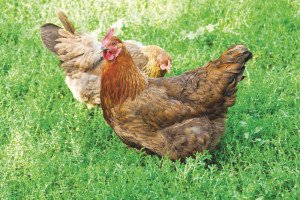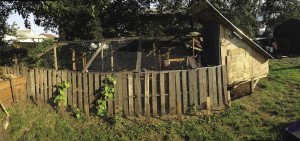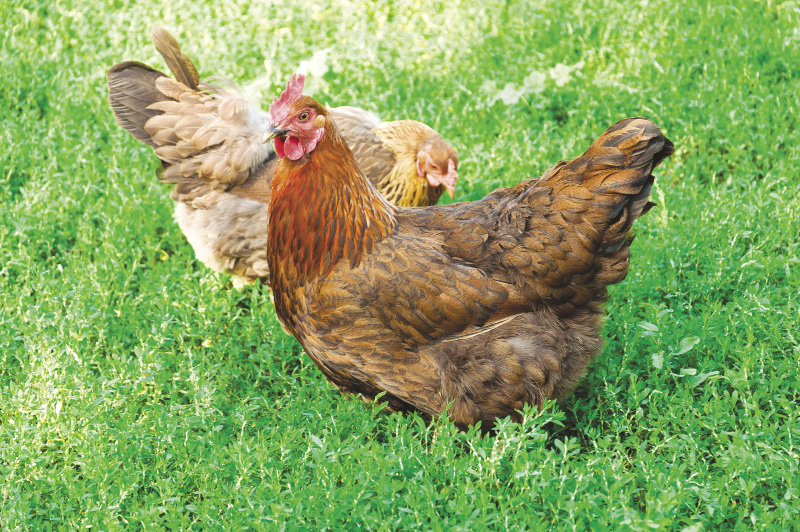Almost 60 years ago, my grandparents immigrated to Canada and settled in Thunder Bay. Over the years, they were followed by their parents, relatives and other Italians who joined the influx of newcomers to the city, collectively populating the historic Bay & Algoma neighbourhood.
My mother can recall seasonal chicken culls in the basement of the house where she grew up as a child, but the details are not gruesome or gory—if anything, food-related gatherings, at any stage of the process, were family affairs that brought the grandparents, parents, cousins and siblings together.

I remember some of these events, too: Assembly line-style tomato canning in the garage, the adults curing meats and making sausages, and watching my Nonno crush grapes to make wine. There was even a rabbit that he raised in a cage behind his shed before it disappeared (into the roasting pan). But it was after I starting raising my own chickens and tending a garden that the generation gap between my grandparents and I really started to shrink. Before my 20s, we had little in common in the way of our lifestyle. Now they come over to admire my garden in the summer, visit the chickens and happily return home with a dozen eggs.
Raising backyard chickens isn’t something new, but it has been phased out with the modernization of Western lifestyle. Perhaps three generations ago, having a few hens in the household was as common as having a clothesline or a garden. And it’s easy to see why a small flock of birds can be such a boon to the backyard: Chicken manure provides excellent fertilizer for the garden and birds naturally scratch at the earth to peck out pests and weeds. Not to mention, raising your own flock moves away from supporting industrial farm operations and having a more intimate connection to animals and food sources offers valuable lessons for people of all ages. My three-year-old niece happens to love eggs and one of her favourite things about
coming to the backyard is opening the nesting boxes to look for the colourful prizes inside.
Believe it or not, there are dozens and perhaps hundreds of breeds of chickens, with heritage varieties preserving the most unique physical traits. Polish chickens, for example, boast an extravagant crest of feathers on their heads. Brahmas lay light to dark brown eggs and are admired for their delicate, penciled plumage and gentle disposition. Ameraucanas, like the two black and gold-feathered ones that I own, lay blue-green eggs. They’re bearded and pea-combed, making them more resilient in the cold. If you’re shopping around for a flock, choosing birds that are hardy enough for our Northern climate is a must.
Becoming familiar with common concerns and best practices are keys to responsible animal husbandry. Luckily, most problems have practical solutions. Like many animals, chickens can host mites, lice and other subtly pernicious critters that love to cling on and live among them. Provide regular dust baths, keep a clean coop and lay fresh bedding, and you’re winning the battle. With a little education and regular monitoring, the work that comes with maintaining a flock is far outweighed by the benefits of having freshly laid eggs at the table.

The author’s chicken coop in her backyard. | JULIA PRINSELAAR
As more cities recognize the importance of community resilience and food security, urban agriculture initiatives are cropping up in neighbourhoods across the world. Through manageable pockets of community and backyard gardens, edible food forests, honeybee hives and the raising of small livestock animals, people gain affordable access to nutritious, local food while building life skills and connecting with others.
Moncton, Minneapolis, Montreal, Victoria, Vancouver, Los Angeles, New York and Kingston join a growing list of jurisdictions in North America that have legalized backyard chickens in recent years and Thunder Bay may soon become part of it.
In response to growing local interest, the Thunder Bay and Area Food Strategy is hosting an open house on April 6 from 4-7 p.m. at the CLE Heritage Building to collect feedback from the public on this issue. The goal is to bring recommendations to municipal council that support a bylaw for backyard chickens.
According to research from the California-based Community Food Security Coalition’s North American Initiative on Urban Agriculture, urban agriculture builds social capital through trust, civic engagement, the development of community leaders, and the sharing of goods, skills and services. In other words, the more connected our communities are to their food sources, the more we get to know our neighbours, help one another and take pride in our communities.
For me, chickens have done just that. Because of my flock, I’ve connected with more people in my neighbourhood than I could have ever hoped to. One dad brings his three sons over to see the birds, and they live two blocks away. Impressed by this addition to our neighbourhood, our Portuguese neighbour raises rabbits and came over to show us his pigeons. He now shares seeds from his garden to grow in my own. Symbolically, I don’t think it gets any better than that.





